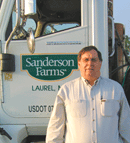 Name: Joe Stianche
Name: Joe Stianche
Company: Sanderson Farms
Title: Fleet manager
Other Positions Held: VP maintenance, maintenance manager, shop manager, technician
Industry Experience: 38 years
Associations: TMC member and chairman of the S.6 Chassis study group
Finding the right employees in a growing company and keeping up with the complexity of vehicles are two challenges that Joe Stianche, fleet manager of Sanderson Farms, faces at the vertically integrated producer of poultry products based in Laurel, Miss.
 “ Our fleet is very diverse because we do so many things for our company,” says Stianche, who is responsible for 61 employees at nine shops scattered throughout Mississippi, Georgia and Texas. “We are responsible for 1,000 vehicles, from lawnmowers to locomotives, and everything in between.” That includes 400 tractors and a variety of trailers, including about 200 reefers.
“ Our fleet is very diverse because we do so many things for our company,” says Stianche, who is responsible for 61 employees at nine shops scattered throughout Mississippi, Georgia and Texas. “We are responsible for 1,000 vehicles, from lawnmowers to locomotives, and everything in between.” That includes 400 tractors and a variety of trailers, including about 200 reefers.
“Most of our facilities are out in the middle of nowhere, so we have to be able to rescue ourselves,” he says. “If we need an emergency repair, we’ll tow if we have to, but we want to avoid doing that.”
Recruitment
The company opened a new maintenance shop in Adel, Ga., in April, and plans to open a larger one in Waco, Texas, next year to support the company’s expansion and growth in those areas. Finding qualified technicians in the company’s mostly rural southern towns is the most formidable challenge, Stianche says.
“First and foremost, we must be respected in the communities in which we live and work,” he says. “Our management must be seen as leaders in the community, and our facilities must be seen as first rate, or we can never expect to have a chance to get good employees. We have been able to attract enough experienced technicians primarily by word of mouth and limited advertising.” That’s largely because of the feeder system the company has developed from nearby community colleges, where many of the company’s entry-level technicians earn certificates or associate degrees.
“Our company has an internship program for high-school and college students,” Stianche says. “Each spring, students are recruited for a summer jobs program. Those selected are offered summer employment in various areas of the company. In the shops, we look for students interested in a career in vehicle maintenance. We have managed to hire many of these students full-time after graduation.”
Stianche says he likes to offer part-time or summer employment to students who are enrolled at community colleges.
“What has worked best for us is to get community-college students between their first and second years of junior college who have made a commitment to finish the program,” he says. “These students are pliable enough to learn new things, and you get a whole year to work with them before they graduate.”
Each supervisor in the eight shops is responsible for having a regular dialog with instructors at community colleges in their communities, Stianche says.
“They need to find out how we can work together to help each other and encourage new people in the industry. We’ve had schools dismantle our salvage vehicles in the past. We also attempt to schedule vendor training at community colleges, so our in-service technicians and students both gain from the experience.”
Keeping costs down
Each of the eight maintenance shops is a profit center within the company that sells its parts and labor at cost, including freight and taxes, to other departments in the company, Stianche says.
“We are not expected to make money, but we are expected to distribute our costs to our customers,” he says. “We do this at a rate that is a substantial savings over outside vendors.” And, that’s important in a cost-conscious industry like the poultry business.
“Chicken products are available to consumers at attractive pricing, so we must have the cost side of our business in order,” Stianche says.
All shop-related costs are managed through a maintenance software package called Shopfax purchased from World Wide Information Systems, he says. Parts, labor, inventories and outside repairs all flow through the system. It also tracks vehicle costs and mechanics’ time for accountability and productivity.
“Many of our parts and operations are bar-coded for ease of tracking,” Stianche says. “Technicians can open their own jobs and charge parts electronically from their personal computers. When jobs are closed by a shop clerk or supervisor, the vehicle and department are billed.”
Because of the diversity of the company’s fleet, its shops are challenged to keep up with diagnostic software needed for proper support, Stianche says. Each large shop has three PCs: one for the clerk, one for the technicians and one for the shop supervisor. Resident on each of the PCs is the Shopfax interface for repair order processing and PC diagnostics.
“We are moving toward having PC-based diagnostics on the shop supervisors’ PCs, which, in most cases, is a portable with a docking station,” he says. “We also use hand-held diagnostic tools at each shop for quick checks.”
Electronics on vehicles have become sophisticated and diverse, which creates challenges.
“Every engine manufacturer has its own software package, and each one is a little different, Stianche says. “We have a forklift with three microprocessors: one for the engine, one for the vehicle and one for the lift mechanism. That’s a lot of technology in the chicken business.”
